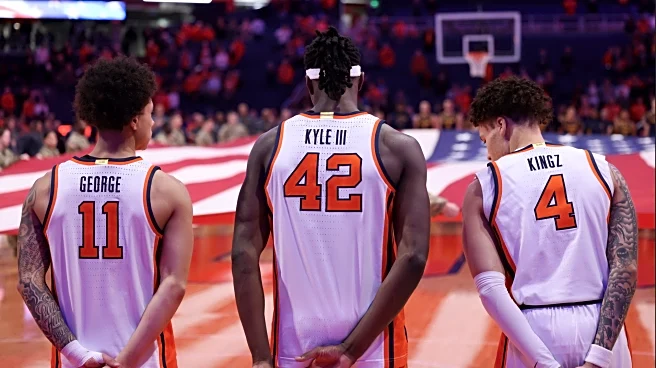What's Happening?
A computer model from SportsLine has released its predictions for the 2025 Fantasy football season, identifying potential breakout players. The model, which has a history of accurate predictions, suggests that Vikings quarterback J.J. McCarthy and Cardinals receiver Marvin Harrison Jr. are among the players expected to have standout performances. McCarthy, returning from a torn meniscus, is set to lead the Vikings with a strong offensive lineup, while Harrison Jr. aims to improve his chemistry with quarterback Kyler Murray after a challenging rookie season. The model's predictions are based on simulations of the entire NFL season, offering insights into player performance and Fantasy football strategies.
Why It's Important?
The predictions from SportsLine's model are significant for Fantasy football enthusiasts and NFL stakeholders, as they provide insights into player potential and team dynamics. Accurate forecasts can influence draft strategies and player valuations, impacting Fantasy leagues and fan engagement. For NFL teams, identifying breakout players can affect game strategies and player development plans. The model's track record of predicting successful seasons for players like Jayden Daniels and Derrick Henry highlights its influence on Fantasy football decisions and its potential to shape perceptions of player capabilities.
What's Next?
As the 2025 NFL season progresses, Fantasy football players and analysts will closely monitor the performance of predicted breakout stars like J.J. McCarthy and Marvin Harrison Jr. Their success could lead to increased attention from fans and media, affecting their marketability and career trajectories. NFL teams may adjust their strategies based on these players' performances, potentially influencing team dynamics and playoff prospects. Fantasy football participants will continue to refine their strategies using insights from the model, aiming to optimize their rosters and achieve league victories.
Beyond the Headlines
The use of advanced computer models in predicting Fantasy football outcomes reflects a broader trend towards data-driven decision-making in sports. This approach raises questions about the balance between traditional scouting methods and technological innovations. As models become more sophisticated, they may challenge conventional wisdom and alter perceptions of player potential, impacting how teams and fans engage with the sport. The ethical implications of relying on technology for player evaluations and the potential for bias in algorithms are areas for ongoing discussion.










